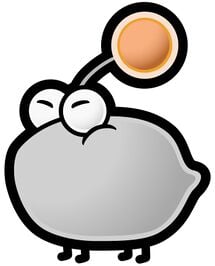Puniper: Difference between revisions
From the Super Mario Wiki, the Mario encyclopedia
Jump to navigationJump to search
Technetium (talk | contribs) m (Moved quote to be after infobox) Tag: Mobile edit |
|||
| Line 36: | Line 36: | ||
|ItaM=Portmanteau of ''Fufino'' ("Puni") and the male name "Furio" | |ItaM=Portmanteau of ''Fufino'' ("Puni") and the male name "Furio" | ||
|Kor=말랑욱 | |Kor=말랑욱 | ||
|KorR=Mallang | |KorR=Mallang'uk | ||
|KorM= | |KorM= | ||
|Spa=Punilio | |Spa=Punilio | ||
Revision as of 14:33, July 10, 2024
| Puniper | |
|---|---|

| |
| Species | Puni |
| First appearance | Paper Mario: The Thousand-Year Door (2004) |
| Latest appearance | Paper Mario: The Thousand-Year Door (Nintendo Switch) (2024) |
- “Don't get a swelled head! This doesn't mean I'll accept you as our leader...”
- —Puniper, Paper Mario: The Thousand-Year Door
Puniper is an obese Puni that lives in the Great Tree in Paper Mario: The Thousand-Year Door. He doubts Mario's skills as a hero at first but eventually he sees Mario as a good leader. He does not help initially and will not support Mario until he saves the Puni elder. Puniper's name is a portmanteau of "Puni" and "Juniper".
Tattle information
- That's Puniper of the Punies. He sure is big for a Puni. Too bad his head is big, too!
- That's Puniper of the Punies. He's a little bigger than the others, obviously. So maybe he can help us reach that special area... Hee hee! Just kidding. His only special power is complaining, I think.
- That's Puniper of the Punies. This guy just needs to stop whining and do what's right. I mean, he's huge! When you got a big bod, you gotta step up and take charge!
Gallery
Names in other languages
| Language | Name | Meaning | Notes |
|---|---|---|---|
| Japanese | プニタ[?] Punita |
From "Puni" and「た」(-ta), usually used for masculine name ending | |
| Chinese | 普尼搭[?] Pǔnídā |
Transliteration of the Japanese name | |
| Dutch | Maxini[?] | From the name "Max" and "mini" or Ini ("Puni"). "Max" may also allude to his larger body shape. | |
| French | Pounibo[?] | ? | |
| German | Bubulas[?] | Bubu ("Puni") and the name "Nicolas" | |
| Italian | Fufurio[?] | Portmanteau of Fufino ("Puni") and the male name "Furio" | |
| Korean | 말랑욱[?] Mallang'uk |
? | |
| Spanish | Punilio[?] | From "Puni" and the male name "Emilio" |

